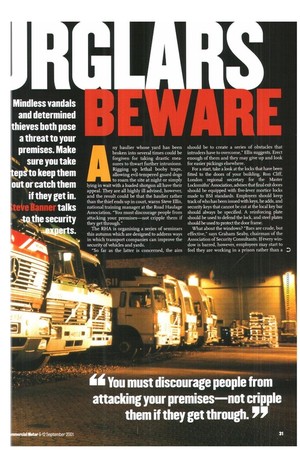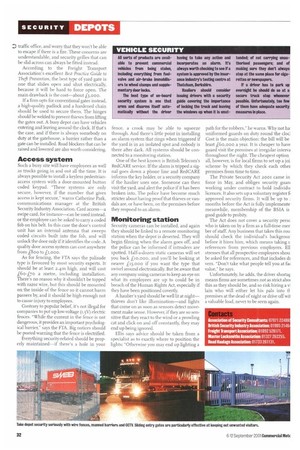A ny haulier whose yard has been broken into several times
Page 31

Page 32

If you've noticed an error in this article please click here to report it so we can fix it.
could be forgiven for taking drastic measures to thwart further intrusions. Rigging up lethal booby traps, allowing evil-tempered guard dogs to roam the site at night or simply lying in wait with a loaded shotgun all have their appeal. They are all highly ill advised, however, and the result could be that the haulier rather than the thief ends up in court, warns Steve Ellis, national training manager at the Road Haulage Association. You must discourage people from attacking your premises—not cripple them if they get through."
The RHA is organising a series of seminars this autumn which are designed to address ways in which transport companies can improve the security of vehicles and yards.
likirhe
"So far as the latter is concerned, the aim should be to create a series of obstacles that intruders have to overcome," Ellis suggests. Erect enough of them and they may give up and look for easier pickings elsewhere.
For a start, take a look at the locks that have been fitted to the doors of your building. Ron Cliff London regional secretary for the Master Locksmiths' Association, advises that final exit doors should be equipped with five-lever mortice locks made to BSI standards. Employers should keep track of who has been issued with keys, he adds, and security keys that cannot be cut at the local key bar should always be specified. A reinforcing plate should be used to defend the lock, and steel plates should be used to protect the door frame.
What about the windows? "Bars are crude, but effective," says Graham Seaby, chairman of the Association of Security Consultants. If every window is barred, however, employees may start to feel they are working in a prison rather than a
D traffic office, and worry that they won't be able to escape if there is a fire, These concerns are understandable, and security grilles that can be slid across can always be fitted instead. According to the Freight Transport Association's excellent Best Practice Guide to Theft Prevention, the best type of yard gate is one that slides open and shut electrically. because it will be hard to force open. The main drawback is the cost—about L3,000.
If a firm opts for conventional gates instead, a high-quality padlock and a hardened chain should be used to secure them. The hinges should be welded to prevent thieves from liThng the gates out. A busy depot can have vehicles entering and leaving around the clock. If that's the case, and if there is always somebody on duty at the gatehouse, a barrier rather than a gate can be installed. Road blockers that can be raised and lowered are also worth considering.
Access system
Such a busy site will have employees as well as tnicks going in and out all the time. It is always possible to install a keyless pedestrianaccess system with a door-mounted button coded keypad. "These systems are only secure, however, if the number that gives access is kept secure," warns Catherine Park, communications manager at the British
Security Industry Association. Card access a swipe card, for instance—can be used instead. or the employee can be asked to carry a coded fob on his belt. In this case the door's control unit has an internal antenna that sweeps coded circuits built into the fob, and will unlock the door only if it identifies the code. A quality door access system can cost anywhere from g 00 to i'L000.
As for fencing, the FTA says the palisade type is favoured by most security experts. It should be at least 2.4rn high, and will cost go-ko a metre, including installation. There's no reason why it shouldn't be topped with razor wire, but this should be mounted on the inside of the fence so it cannot harm passers by, and it should be high enough not to cause injury to employees.
Contrary to popular belief, it's not illegal for companies to put up low-voltage (T.5V) electric fences. "While the current in the fence is not dangerous, it provides an important psychological barrier," says the FIA. Big notices should be posted warning that the fence is electrified.
Everything security-related should be properly maintained—if there's a hole in your fence, a crook may be able to squeeze through. And there's little point in installing an alarm system that rings when triggered if the yard is in an isolated spot and nobody is there after dark. All systems should be connected to a monitoring station.
One of the best known is British Telecom's RedCA RE service. If the alarm is tripped a signal goes down a phone line and RedCARE informs the key holder, or a security company if the haulier uses one. Someone can then visit the yard, and alert the police if it has been broken into. The police have become much stricter about having proof that thieves or vandals are, or have been, on the premises before they respond to an alarm.
Monitoring station
Security cameras can be installed, and again they should be linked to a remote monitoring station when the depot is deserted. They will begin filming when the alarm goes off, and the police can be informed if intruders are spotted. Half-a-dozen static cameras will set you back Lio,000, and you'll be looking at nearer fis,000 if you want the type that swivel around electronically. But be aware that any company using cameras to keep an eye on what its employees are up to could be in breach of the Human Rights Act, especially if they have been positioned covertly.
A haulier's yard should be well lit at night— thieves don't like illumination—and lights that come on as soon as sensors detect movement make sense. However, if they are so sensitive that they react to the wind or a prowling cat and click on and off constantly, they may end up being ignored.
Ellis says advice should be taken from a specialist as to exactly where to position the lights: "Otherwise you may end up lighting a path for the robbers," he warns. Why not ha: uniformed guards on duty round the cloc: Cost is the main objection: the bill will be least L6c),000 a year. It is cheaper to have guard visit the premises at irregular interva throughout the night. The cheapest option all, however, is for local firms to set up a joi scheme by which they check each othel premises from time to time.
The Private Security Act 2001 came in force in May, and obliges security guar/ working under contract to hold individu licences. It also sets up a voluntary register f approved security firms. It will be up to : months before the Act is fully implemente meanwhile, membership of the BSIA is good guide to probity.
The Act does not cover a security persc who is taken on by a firm as a full-time me r her of staff. Any business that takes this rou should check the individual's backgrour before it hires him, which means taking u references from previous employers. Ell stresses that all prospective employees shou. be asked for references, and that includes di vers. "Don't take what people tell you at fac value," he says.
Unfortunately, he adds, the driver shorta means firms are sometimes not as strict aboi this as they should be, and so risk hiring a v: lain who will either let his pals into if premises at the dead of night or drive off wit a valuable load, never to be seen again.




































































































































